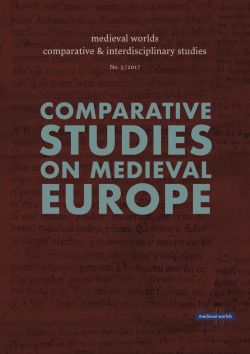|
 |
MEDIEVAL WORLDS provides a new forum for interdisciplinary and transcultural studies of the Middle Ages. Specifically it encourages and links comparative research between different regions and fields and promotes methodological innovation in transdisciplinary studies. Focusing on the Middle Ages (c. 400-1500 CE, but can be extended whenever thematically fruitful or appropriate), MEDIEVAL WORLDS takes a global approach to studying history in a comparative setting.
MEDIEVAL WORLDS is open to regular submissions on comparative topics, but also offers the possibility to propose or advertise subjects that lend themselves to comparison. With a view to connecting people working on related topics in different academic environments, we publish calls for matching articles and for contributions on particular issues.
Table of Contents
Walter POHL, Editor’s Introduction
The Sudden Success of Prose –
a Comparative View of Greek, Latin, Old French and Old Norse
Lars Boje Mortensen
Could Isidore’s Chronicle Have Delighted Cicero? A Response
Richtard W. Burgess and Michael Kulikowski
Revisiting Pre-Modern Ethnicity and Nationhood: Preface
Ilya Afanasyev and Nicholas S. M. Matheou
»Becoming English«: Nationality, Terminology,
and Changing Sides in the Late Middle Ages
Andrea Ruddick
Reinventing Roman Ethnicity in High and Late Medieval Byzantium
Yannis Stouraitis
The Characteristics of Bodies and Ethnicity c. 900-1200
Claire Weeda
Rethinking Ethnicity and ›Otherness‹ in Early Anglo-Saxon England
James M. Harland
Church, Apostle and People in Early Ireland
Patrick Wadden
Digitising Patterns of Power (DPP):
Applying Digital Tools in the Analysis of Political and Social Transformations
in the Historical Region of Macedonia (12th–14th Centuries)
Mihailo St. Popović and Veronika Polloczek
The Bible in Historical Perception and Writing
of the Transcultural Iberian Societies, Eighth to Twelfth Centuries
Matthias Tischler und Patrick Marschner
The journal is funded by the Austrian Science Fund (FWF).

|





 Home
Home Print
Print
 References
References
 Share
Share
